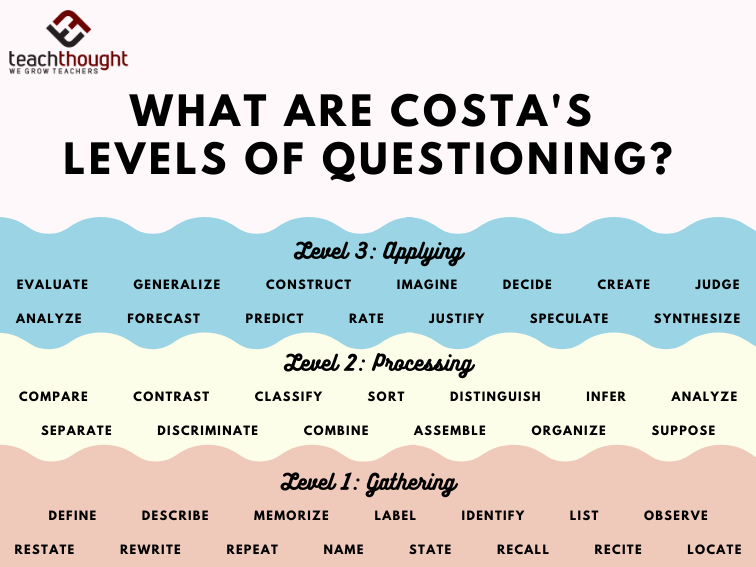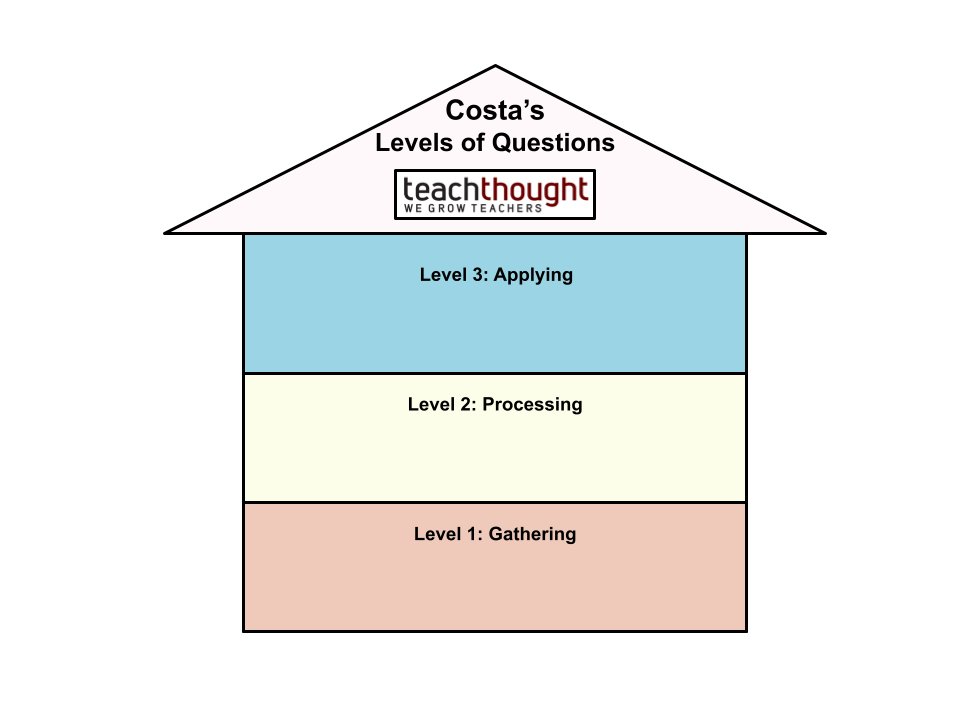

Costa’s Levels of Questioning– created by educational researcher Art Costa– include 3 tiers of examining made to promote higher-level reasoning and query.
Comparable to Bloom’s taxonomy , Costa’s lower level prompts trainees to utilize more standard professors; as trainees move up in levels, the concerns motivate them to make use of more complicated thinking skills. With years of research study on human strength, Dr. Costa also determined the 16 Habits of Mind , a collection of habits that sustain pupils in browsing the challenges that frequently happen in school and life, generally. Numerous of Dr. Costa’s 16 behaviors– assuming interdependently, innovating, gathering data, and applying previous understanding to brand-new scenarios– both require and reinforce greater levels of doubting.
There is a substantive quantity of research study that supports Dr. Costa’s schema. Newmann (1993 found that higher-order thinking compels trainees to “adjust information and ideas in ways that change their definition,” and “anticipates trainees to address problems and develop meaning for themselves,” which straightens with a constructivist sight of education
Costa’s Levels of Questioning are normally illustrated using the metaphor of a house with 3 floors:


Degree 1: Collecting
Level 1 inquiries generally call for pupils to work with information ‘on the web page.’ Answers to degree 1 concerns are generally literal; significance, a pupil can essentially indicate the answer on a web page.
We’ve formerly covered Blossom’s Taxonomy power verbs , so you can anticipate that Costa’s levels have their very own collection of power verbs, too. Right here are a couple of that you could locate at the start of Level 1 inquiries:
- Define
- Define
- Remember
- Tag
- Identify
- Checklist
- Observe
- Restate
- Reword
- Repeat
- Call
- State
- Recall
- Recite
- Situate
- Select
- Match
- Program
Level 1 concerns by material location could resemble these examples:
- Scientific research : Tag the parts of an animal cell.
- Math : Recite the formula for locating the quantity of a cyndrical tube.
- History : Suit the name of the queen to their corresponding country.
- English Language Arts : Situate the place in the plot where the orgasm occurs.
You can see exactly how the majority of these Level 1 power verbs need students to recall info, which is a crucial ability in its very own right. Nonetheless, teachers should pursue most of their concerns to drop in Degree 2 or 3, which challenge trainees to use higher-order thinking abilities.
Level 2: Handling
Degree 2 questions go a step additionally than Degree 1, prompting pupils to refine information by ‘reading in between the lines.’ While students may need to use literal information to create their reactions, Level 2 requires them to refine that details with what they already know in order to make new links.
Here are some instances of Degree 2 power verbs:
- Contrast
- Comparison
- Classify
- Type
- Distinguish
- Infer
- Evaluate
- Different
- Discriminate
- Incorporate
- Assemble
- Organize
- Intend
Degree 2 questions by content location might turn up in the adhering to methods:
- Science : Contrast the processes of mitosis and meiosis.
- Mathematics : Identify the geometric forms according to their number of sides and angles.
- History : Put together the complying with historical events in the order of significance, from many to least.
- English Language Arts : Analy ze the effect that the writer’s tone has on the general meaning of the message.
Can you see just how Level 2 questions go a step even more than Degree 1 Greater than merely spitting up info, students take it and ‘do something’ with it. They classify, make differences, and compare/contrast it against one more part to see how it affects the entire. These type of skills can promote interest and build a bridge to the questions that truly generate imagination and higher-level reasoning.
Level 3: Applying
While Level 1 inquiries motivate pupils to collaborate with input, and Level 2 inquiries challenge them to refine that input in order to make brand-new links. Below, trainees take part in the highest-level thinking skills to create an output. This might result from making analyses and analyses, testing services to various issues, or making predictions.
We’ve consisted of some examples of Level 3 power verbs below:
- Examine
- Generalize
- Create
- Envision
- Make a decision
- Produce
- Judge
- Assess
- Projection
- If/then
- Anticipate
- Price
- Warrant
- Speculate
- Manufacture
- Build
- Assume
Level 3 concerns by content area may appear like the following:
- Science : Based upon data from the last years of cyclone activity in the southeast U.S., forecast just how the frequency of cyclone task will transform in the following 10 years.
- Math : Price the chance of a governmental candidate winning the election based on protecting the electoral ballots from the following united state states: Florida, The Golden State, Virginia, New York, Illinois.
- History : Produce a social compact that considers the results of globalization and technological advancement in the 21 st century.
- English Language Arts : Build an argument that safeguards or refutes obligatory worker inoculation plans in the United States.
Whether preparing for discussion-based activities, project-based understanding, or independent inquiry, teachers ought to strive to orient most of trainee reasoning and engagement at Levels 2 and 3 Analyses that prompt trainees to remember standard realities (such as the day of a historic event, or the name of an author, or the formula for a formula) do not truly analyze pupils’ capacity to apply new skills or details to brand-new contexts. A Degree 2 or 3 question would certainly test students to make links with basic details. For example, rather than remembering a simple date, a much more flexible inquiry would certainly ask trainees to predict, based upon the moment in history that a particular event took place, the likelihood of it repeating, provided a comparable sociopolitical environment. Along the exact same lines, instead of recalling the names of popular writers, an instructor may challenge pupils to make an argument for exactly how an author would certainly blog about a specific modern concern.
In “A Talk to Educators,” James Baldwin described the mystery of education and learning: “As one starts to become conscious, one begins to analyze the society in which [they] are informed.” Level 2 (and primarily, level 3 inquiries intend to cultivate this sort of reaction in pupils, to create them to tilt their heads, do double-takes, point out disparities, disrupt the status quo, determine flaws in current organizations, and create cutting-edge remedies for those flaws. These are the inquiries that influence us to find up with even more inquiries, to consider our thinking, and to evolve– both as individuals and societies.